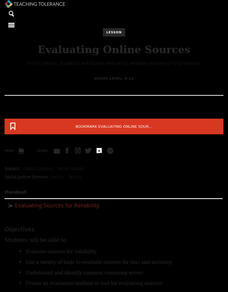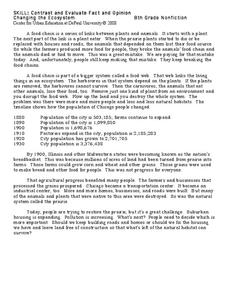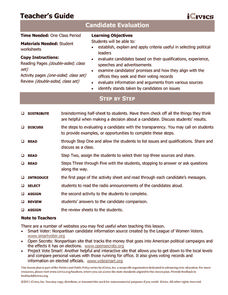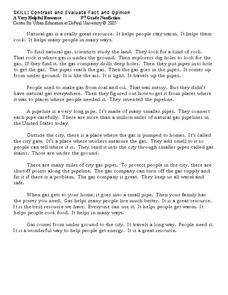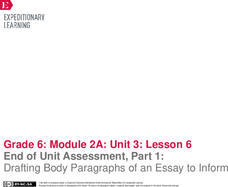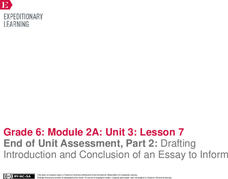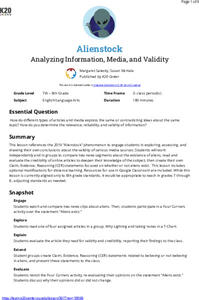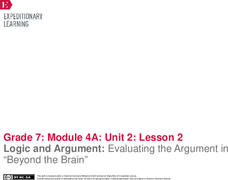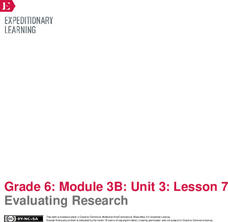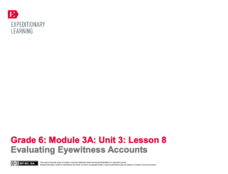Curated OER
The Big 6
Before beginning the process of research, go through the steps necessary to procure information. "The Big 6" teaches students to find, use, apply, and evaluate information according to their needs. Help learners not be overwhelmed by...
Curated OER
Strategic Skill: Evaluating Information Quality Using Electronic Sources
Fourth graders review and complete evaluating information quality. In groups, they research the diversity of the numerous Native American tribes in Montana. They complete a worksheet on evaluating sources on the Internet and share...
Curated OER
Information Problem Solving
Students locate the specific elements of text and illustrations that communicate setting, characterization, and plot in order to evaluate how the text and illustrations work together to communicate effectively.
Teaching Tolerance
Evaluating Online Sources
Newspapers, television, social media ... how do people get their news? Using the informative resource, scholars locate and verify credible sources of information. Working in small groups, they discuss strategies for evaluating the...
Teaching Tolerance
Understanding and Evaluating Online Searches
With billions of options to choose from, how can people determine which online sources are reliable? Using an informative resource, pupils first discuss and evaluate a sample search result handout. Next, partners create a checklist for...
Curated OER
Information from Posters
Budding journalists examine and evaluate an informative poster advertising a public meeting to discuss city park issues. They write a paragraph explaining what they found to be effective and ineffective about the poster, then imagine...
PBIS World
Student Self-Evaluation Form
Here's a self-evaluation form designed to get pupils thinking about their behaviors, both the positive and the negative.
DePaul University
Contrast and Evaluate Fact and Opinion
How can you tell when an author is expression an opinion or stating a fact? Use two short reading selections to emphasize the difference between a statement that you can prove and one that you can't. The first passage explains food...
College Board
Evaluating Sources: How Credible Are They?
How can learners evaluate research sources for authority, accuracy, and credibility? By completing readings, discussions, and graphic organizers, scholars learn how to properly evaluate sources to find credible information. Additionally,...
Curated OER
Savvy Surfers: Website Evaluation and Media Literacy
Sixth graders strengthen their understanding of what a high quality website is composed of. Learners evaluate three websites for accuracy, credibility, and reliability by completing a chart.
iCivics
Candidate Evaluation
How can we decide between candidates on election day? After contemplating various issues and qualities, your learners will go through a step-by-step process of researching and evaluating sample candidates and determining their...
EngageNY
Performance Task Preparation: Peer Critique and Mini-Lesson Addressing Common Errors: Revising Draft Essay to Inform
Time to revise! Using a writing evaluation rubric, scholars participate in a peer editing process to provide feedback on each others' informative essays. Next, pupils begin revising their drafts based on the feedback they receive.
DePaul University
Contrast and Evaluate Fact and Opinion
Looking for a resource that helps learners practice identifying fact and opinion? A four-page worksheet includes two informational text reading passages. Pupils read each passage and respond to four multiple choice and one short answer...
EngageNY
End of Unit Assessment, Part 1: Drafting Body Paragraphs of an Essay to Inform
Anybody can write a body paragraph! Pupils analyze the development of ideas in a body paragraph from a model essay. Next, using what they've learned, they draft the body paragraphs of their My Rule to Live By informative essay.
EngageNY
End of Unit Assessment, Part 2: Drafting Introduction and Conclusion of an Essay to Inform
A powerful introduction and conclusion can really pack a punch. Using the resource, scholars first read and discuss a model essay. Then, as part of the end of unit assessment, they draft the introductory and concluding paragraphs of...
Florida Center for Reading Research
Comprehension: Text Analysis, Persuade, Inform, and Entertain Sort
Why do authors write? Practice determining the author's purpose with a categorizing activity. Learners sort twelve short passages into three categories: persuade, inform, and entertain.
Curated OER
Evaluating Information Resources
Students identify at least five aspects to be examined in determining the validity of information presented on a website. They classify websites into highly trustable, trustable or questionable information sources. In addition, they...
K20 LEARN
Alienstock: Analyzing Information, Media, And Validity
One only has to watch MSMBC and FOX News to realize that media can present the same story in very different ways. Middle schoolers have an opportunity to test their ability to determine the validity and trustworthiness of information by...
K20 LEARN
Street Cred: Evaluating Sources
A lesson on evaluating sources of information teaches scholars to "think twice" before using a source. Researchers examine a resource's home page, author, and sponsor, as well as the date published and the documentation provided.
EngageNY
Logic and Argument: Evaluating the Argument in “Beyond the Brain”
The brain is not the mind. Scholars explore the claim by reading an informational article about neuroscience research, "Beyond the Brain." As they read, they answer text-dependent questions and complete an anchor chart to evaluate...
EngageNY
Evaluating an Argument: “Is Google Making Us Stupid?”
Does the Internet negatively affect peoples' brains? Scholars complete a Tracing an Argument note catcher to evaluate the question as they read the text "Is Google Making Us Stupid?" Exploring both sides of the issue, they add their...
EngageNY
Evaluating Research
Calling all archaeologists! Scholars dig through their research about overfishing, searching for the best information to include in their consumer guides. Next, pupils engage in a pair-share activity to discuss their findings with a...
English Enhanced Scope and Sequence
Differentiate between Formal and Informal Language
The Pledge of Allegiance, the Gettysburg Address, the National Anthem, and the Preamble to the Constitution all get close attention in an exercise that asks learners to rewrite these formally-worded documents into informal language....
EngageNY
Evaluating Eyewitness Accounts
That sounds like a plan! Scholars complete the Newspaper Article Planning graphic organizer to understand the process of writing a newspaper article. They also use what they learned about researching factual information and gathering...





